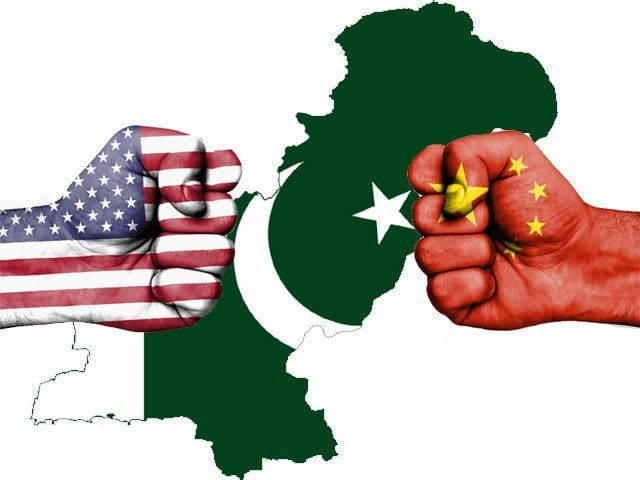Pakistan and the New Cold War
A vortex of the emerging New Cold War between the US, China and Russia

PHOTO: EXPRESS
The collapse of the Soviet Union in 1990 replaced the “bi-polar” world with a “unipolar” global order, dominated by American “exceptionalism”, exercised through “unilateralism” and “preemption” and aimed at perpetuating US global domination. But weakened due to the military disasters in Iraq and Afghanistan, coupled with the financial meltdown of 2008-2009, the US could not prevent the rise of China or the resurgence of Russia. Instead of accepting a rules-based, multipolar international order in concert with Beijing and Moscow, Washington opted for containment and confrontation. Obama’s “Pivot to Asia” policy of strengthening existing alliances with Japan, Australia and South Korea and concluding new strategic partnerships with India and Vietnam, was reinforced by Trump’s National Security Strategy naming China (and Russia) as military “adversaries”.
Chinese pushback under President Xi has led to open confrontation in the so-called Indo-Pacific region between China and the “Quadrilateral” alliance including the US, Japan, Australia and India. The focus of this confrontation is the South China Sea where US naval and air patrols are intruding into territory claimed by China almost daily. Together with rapid militarisation on all sides and the trade war unleashed by Trump, Sino-American relations are at a breaking point.
Similarly, Putin’s resurgent Russia is unwilling to accept US domination and has pushed back in Ukraine and Syria to reassert its great power status.
The commonality of concerns against the US by Russia and China has led to closer political, military and economic relations between them, leading to a new Cold War. But, unlike the previous bipolar Cold War, this one is multipolar and, therefore, far more complex and unpredictable.
Concerned over the possible denial by the US of access to the Indo-Pacific sea-lanes, vital for Chinese trade and energy, President Xi has embarked on his ambitious Belt and Road Initiative (BRI) as an alternative link to the West. CPEC is the flagship project of the BRI. Once CPEC and BRI are operational, the US would lose its major leverage over China. Therefore, CPEC lies at the heart of the emerging Cold War confrontation and places Pakistan in the crosshairs of this confrontation.
The greatest danger for Pakistan arises from the Indo-US strategic partnership to build up India as a counterweight to China. The resultant growth in Indian conventional and strategic weapons capabilities poses an existential threat to Pakistan. Moreover, Washington has fully endorsed New Delhi’s ambitions for a greater role in Afghanistan, which threatens Pakistan on both its eastern and western borders. In this environment, a direct assault on CPEC has been launched by India, with the US backing, through support to ethnic terrorist groups such as the BLA and the TTP, among others. More recently, these groups have carried out terrorist attacks in the Northern Areas such as Chilas, through which the CPEC route passes over the Karakorum Highway to China. Majority of these groups are based and operate from US-controlled Afghanistan while their leadership is scattered in India and European countries. Their facilitators and safe heavens are also spread out within Pakistan and receive funding from their sponsors.
For its part, the US has imposed sanctions on Pakistan while demanding that Pakistan “do more” against the Afghan Taliban. However, the US has taken no action against the TTP nor against the IS which are openly operating in Afghanistan. On the contrary, the US has supported Afghan opposition to the construction of the border fence and other steps for Pakistan-Afghan border management. Within Pakistan, Americans have been funding NGOs and civil society activists that oppose CPEC and pursue separatist agendas.
Since Pakistan’s strategy of ‘Full Spectrum’ deterrence has neutralised India’s conventional and strategic capabilities and American pressure through sanctions has failed, they have now resorted to sub-conventional war, or hybrid war, to destabilise Pakistan and derail CPEC. This is a critical objective of the New Cold War that is being fought within Pakistan. In recognition of these dangers, all national stakeholders need to be unified in protecting and promoting our state interests. Overcoming our current economic malaise and ensuring our future prosperity depends upon successful implementation of CPEC. This would also be key to nurturing our strategic partnership with China, which, along with Russia, can help Pakistan to navigate the turbulent waters of the evolving Cold War. In the immediate context, the American dependence on Pakistan for a settlement in Afghanistan, which they now seek, and their reliance on our cooperation for ground and air links to that country, need to be used to demand a reversal in US policies, especially an end to Indian support for the BLA, the TTP and other terrorist groups as well as action against these groups in Afghanistan. Also the US must respect Pakistan’s security concerns regarding Indian role in the region, especially in Afghanistan.
In this environment, we would not only need to defeat terrorism domestically but also use our pivotal position to benefit from the evolving new Cold War.
Published in The Express Tribune, December 6th, 2018.
Like Opinion & Editorial on Facebook, follow @ETOpEd on Twitter to receive all updates on all our daily pieces.
















COMMENTS
Comments are moderated and generally will be posted if they are on-topic and not abusive.
For more information, please see our Comments FAQ